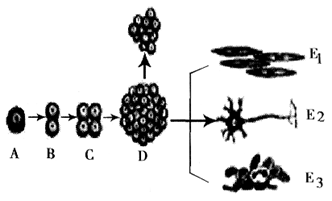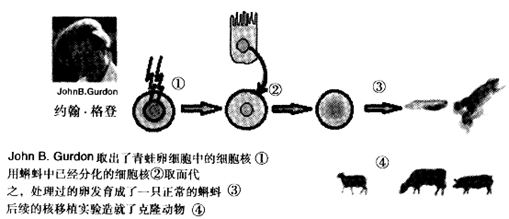阅读下列材料,回答相关问题:(8分)
勇敢向教条说“不”的约翰·格登
资料1 人类都是由受精卵发育而来,在受孕之后的最初几天,组成胚胎的都是未
成熟的细胞。这些细胞每一个都可以发育为成熟有机体中所有细胞类型的细胞。这种未成熟的细胞被称为多功能的干细胞或诱导多功能干细胞。随着胚胎的发育,多功能干细胞进一步形成神经细胞、肌肉细胞、肝脏细胞以及其他所有种类的细胞,这些细胞经过分化后,开始在人体内承担起特殊的机能。很长的一段时间里,人们普遍认为这一过程是单向的、不可逆的。成熟之后的细胞是不可能再回到未成熟、多能性的状态。

根据上图回答:
(1)A→B、B→C、C→D的过程是细胞的__________。在此过程中,首先是___________发生一系列的变化,由一个分成等同的两个;随后_________________也发生一定的变化,由一份分成大体相等的两份,最终每份中都含有一个____________________。
(2)D→E的过程是细胞的__________________。在此过程中细胞的形态、结构、功能发生了变化,但是细胞核内的________________没有发生变化。
资料2 但荣获2012年诺贝尔生理学或医学奖的英国发育生物学家约翰·格登却提出了自己的看法,他假设:这些细胞的基因组仍然包含着驱动它发育成机体所有不同类型的细胞所需的信息。在1962年,在一项经典实验中,他将一个青蛙卵细胞的细胞核替换为成熟肠细胞的细胞核。这个改变了的卵细胞发育成为了一只正常的蝌蚪。这一实验具有划时代的意义,首次证实了已分化的细胞可通过核移植技术将其重新转化为具有多能性的细胞。
起初,这一里程碑式的发现遭到了许多人的怀疑,不少科学家认为这完全不可能。但在重复实验的验证下,该结果最终被接受并引发了密集的研究。随着技术手段的发展,最终导致了哺乳动物的克隆,也使约翰·格登成为细胞核移植与克隆方面的先驱。他的研究告诉人们,一个成熟、已分化细胞的细胞核可以返回到未成熟、多能性的阶段,这为此后诱导多功能干细胞的研究埋下了伏笔。

(3)约翰·格登的研究说明,一个成熟、已分化细胞的细胞核可以返回到__________的阶段。
(4)改变了的卵细胞发育成为一只正常蝌蚪的过程中,要经过细胞分裂和分化形成生物体的各种____________,最终形成器官、系统构成生物体。
(1)分裂 细胞核 细胞质 细胞核
(2)分化 遗传物质
(3)未成熟、多能性
(4)组织
题目分析:(1)图中A→B、B→C、C→D过程是一个的细胞分成两个细胞,两个细胞变成了四个…代表的是细胞分裂,细胞的分裂过程是:细胞核先由一个分成两个,随后,细胞质分成两份,每份各含有一个细胞核,最后在细胞的中央,形成新的细胞膜,动植物不同,植物还需形成新的细胞壁,这样一个细胞就分成了两个细胞。
(2)D→E过程表示的是细胞在生长过程中形态、结构、功能发生了不同的变化,而形态结构相似,功能相同的细胞联合在一起,组成的细胞群叫组织,因此是细胞的分化的过程。
(3)由资料中“首次证实了已分化的细胞可通过核移植技术将其重新转化为具有多能性的细胞”可知约翰·格登的研究说明,一个成熟、已分化细胞的细胞核可以返回到未成熟、多能性的阶段。
(4)细胞在生长过程中形态、结构、功能发生了不同的变化,而形态结构相似,功能相同的细胞联合在一起,组成的细胞群叫组织,因此细胞的分化的结果是形成组织。
点评:此题较新颖,有一定的难度,要善于从资料中获取解题的信息。
